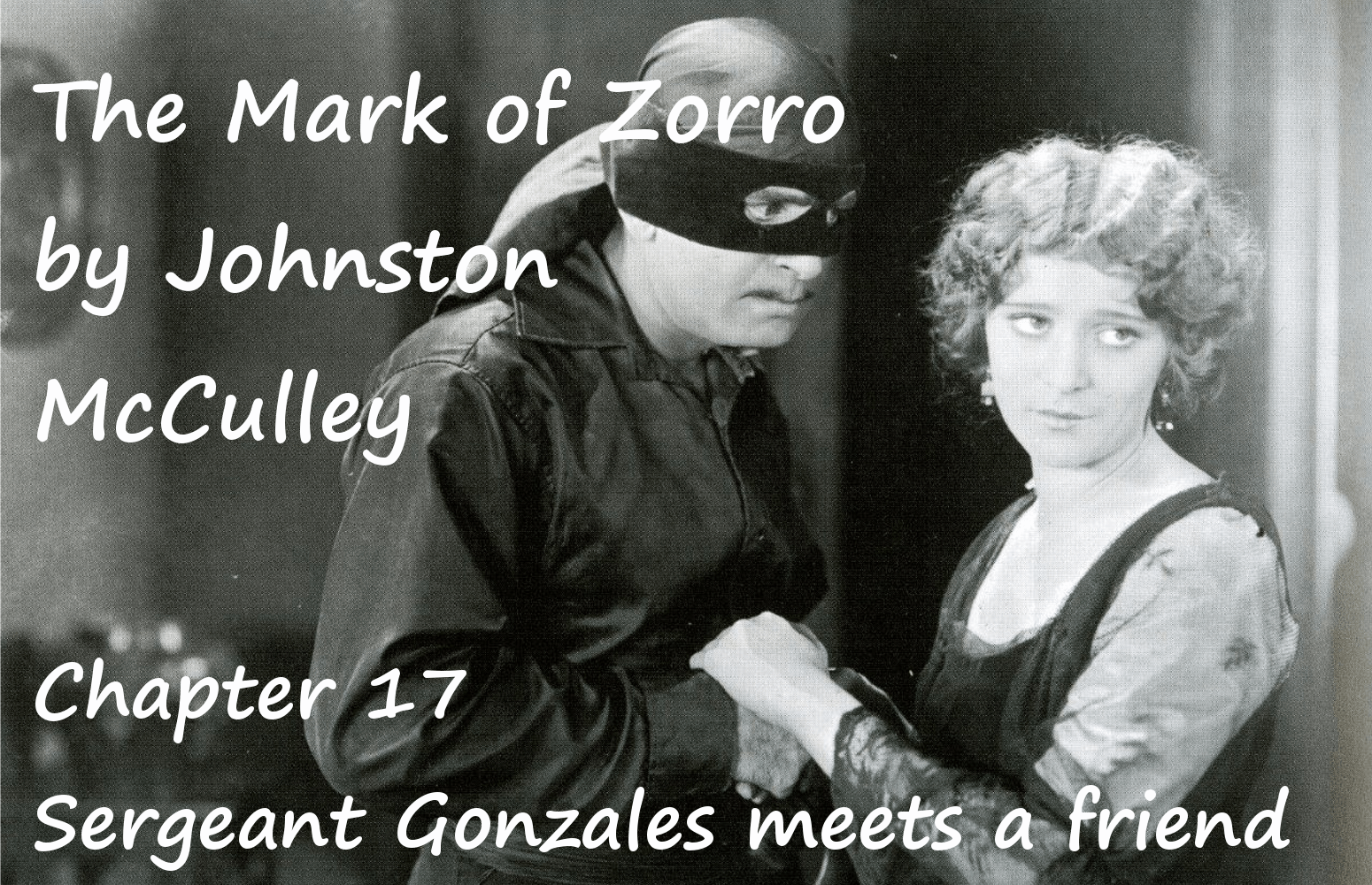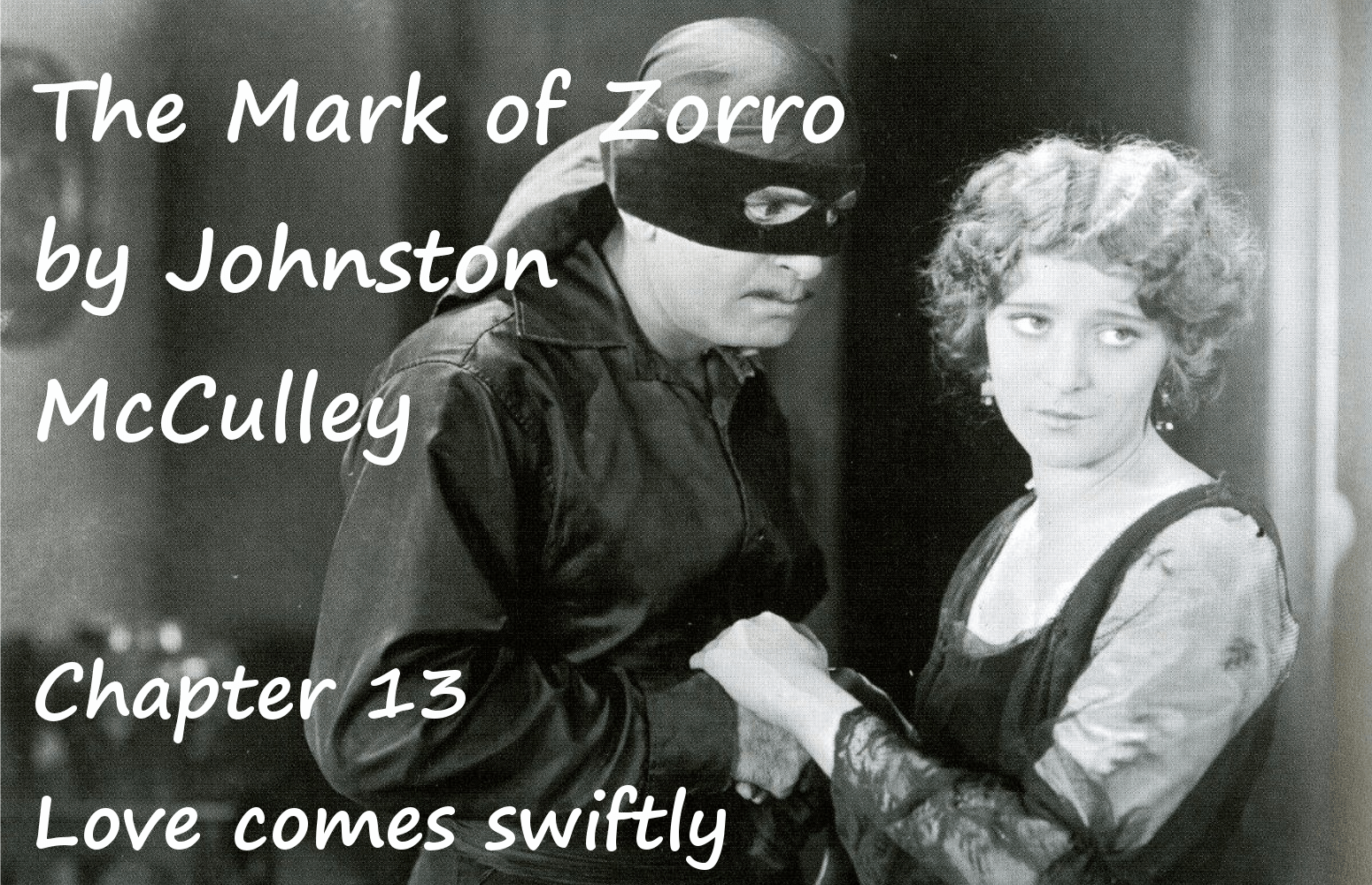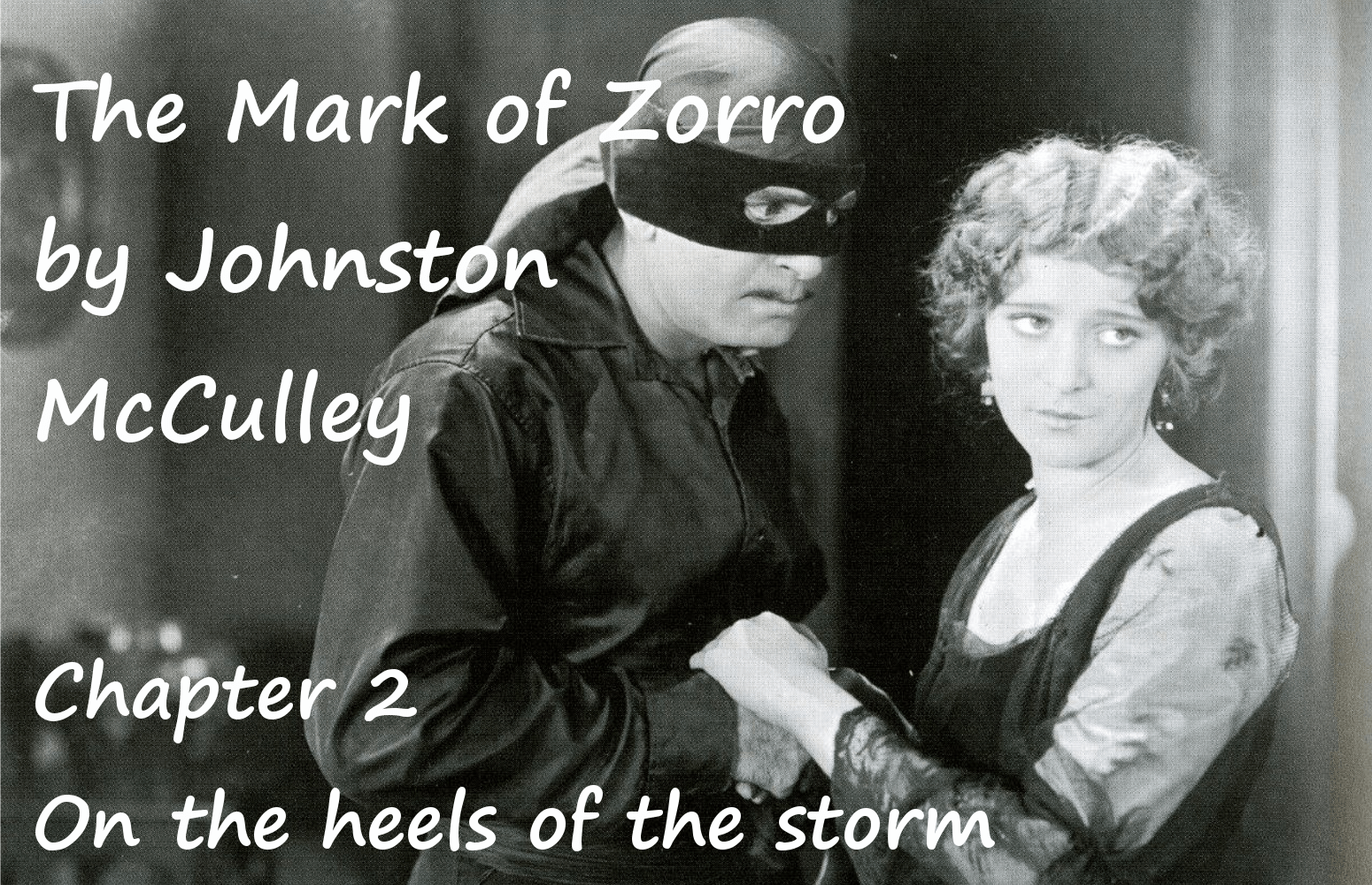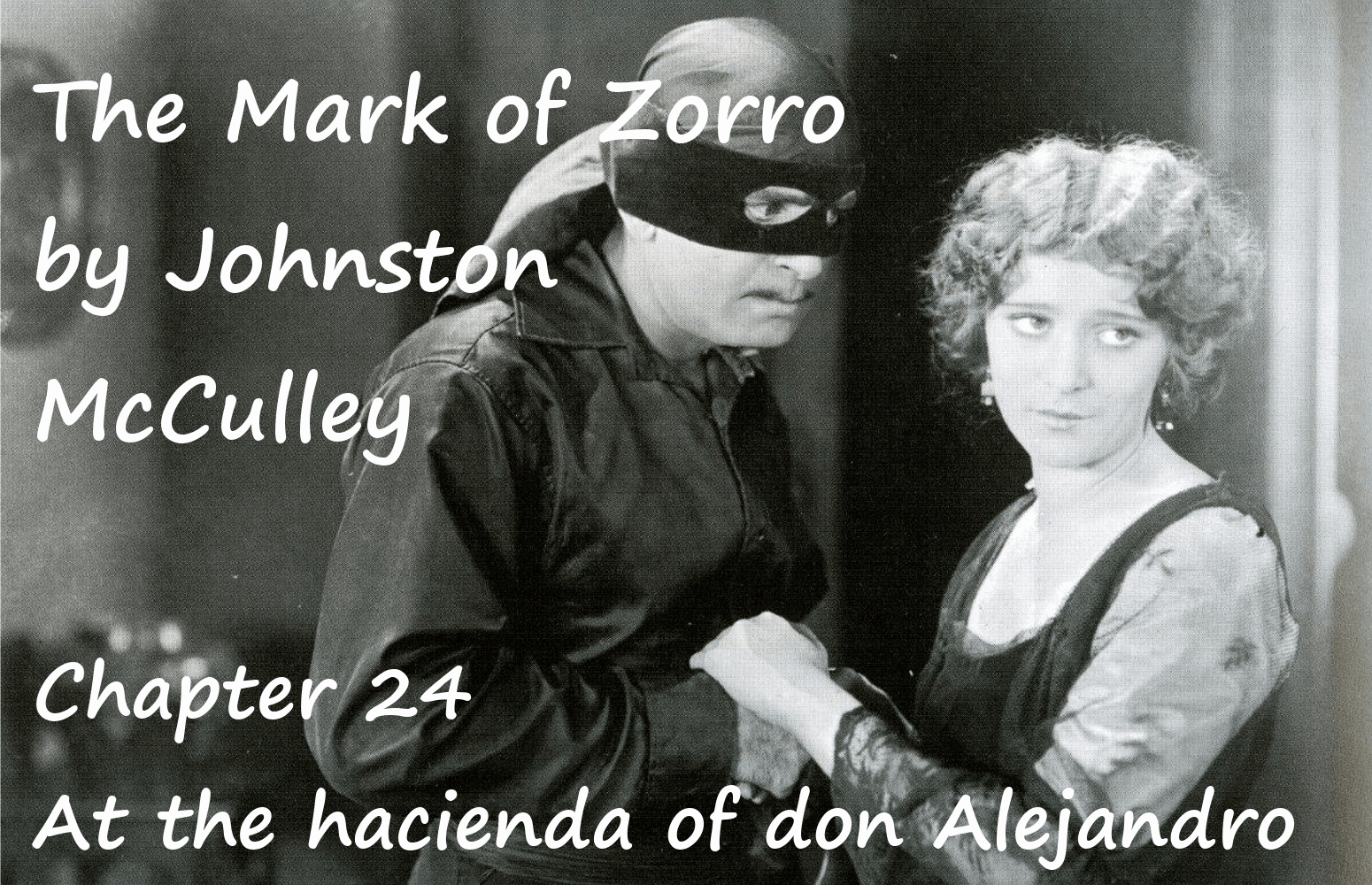The Mark of Zorro chapter 17 Sergeant Gonzales meets a friend
The Mark of Zorro chapter 17 Sergeant Gonzales meets a friend
Author McCulley, Johnston, 1883-1958
Title The Mark of Zorro
Note Published serially under the title: The curse of Capistrano.
Language English
Copyright Status Public domain in the USA.
Presently light showed through the windows, and after a time the door was thrown open. Fray Felipe stood framed in it, shading a candle with his hand—a giant of a man now past sixty, but one who had been a power in his time.
“What is all this noise?” he demanded in his deep voice. “And why do you, son of evil, ride your horse on my veranda?”
“We are chasing this pretty Señor Zorro, fray—this man they call the Curse of Capistrano,” Gonzales said.
“And you expect to find him in this poor house?”
“Stranger things have happened. Answer me, fray! Have you heard a horseman gallop past within a short time?”
“I have not!”
“And has this Señor Zorro paid you a visit recently?”
“I do not know the man you mean.”
“You have heard of him, doubtless?”
“I have heard that he seeks to aid the oppressed, that he has punished those who have committed sacrilege, and that he has whipped those brutes who have beaten Indians.”
“You are bold in your words, fray!”
“It is my nature to speak the truth, soldier!”
“You will be getting yourself into difficulties with the powers, my robed Franciscan.”
“I fear no politician, soldier!”
“I do not like the tone of your words, fray. I have half a mind to dismount and give you a taste of my whip!”
“Señor!” Fray Felipe cried. “Take ten years off my shoulders and I can drag you in the dirt!”
“That is a question for dispute! However, let us get to the subject of this visit. You have not seen a masked fiend who goes by the name of Señor Zorro?”
“I have not, soldier!”
“I shall have my men search your house!”
“You accuse me of falsehood?” Fray Felipe cried.
“My men must do something to pass the time, and they may as well search the house. You have nothing you wish to hide?”
“Recognizing the identity of my guests, it might be well to hide the wine-jugs,” Fray Felipe said.
Sergeant Gonzales allowed an oath to escape him, and got down from his horse. The others dismounted, too, and the sergeant’s mount was taken off the veranda and left with the horse-holder.
Then Gonzales drew off his gloves, sheathed his sword, and stamped through the door with the others at his heels, as Fray Felipe fell back before him, protesting against the intrusion.
From a couch in a far corner of the room there arose a man, who stepped into the circle of light cast by the candelero.
“As I have eyes, it is my raucous friend!” he cried.
“Don Diego! You here?” Gonzales gasped.
“I have been at my hacienda looking over business affairs, and I rode over to spend the night with Fray Felipe, who has known me from babyhood. These turbulent times; I thought that here, at least, in this hacienda that is a bit out of the way and has a fray in charge of it, I could for a time rest in peace without hearing of violence and bloodshed. But it appears that I cannot. Is there no place in this country where a man may meditate and consult musicians and the poets?”
“Meal mush and goat’s milk!” Gonzales cried. “Don Diego, you are my good friend and a true caballero. Tell me—have you seen this Señor Zorro to-night?”
“I have not, my sergeant.”
“You did not hear him ride past the hacienda?”
“I did not. But a man could ride past and not be heard here in the house. Fray Felipe and I have been talking together, and were just about to retire when you came.”
“Then the rogue has ridden on and taken the trail toward the pueblo!” the sergeant declared.
“You had him in view?” Don Diego asked.
“Ha! We were upon his heels, caballero! But at a turn in the highroad he made connection with some twenty men of his band. They rode at us, and attempted to scatter us, but we drove them aside and kept on after Señor Zorro. We managed to separate him from his fellows and give chase.”
“You say he has a score of men?”
“Fully a score, as my men will testify. He is a thorn in the flesh of the soldiery, but I have sworn to get him! And when once we stand face to face—”
“You will tell me of it afterward?” Don Diego asked, rubbing his hands together. “You will relate how you mocked him as he fought, how you played with him, pressed him back and ran him through—”
“By the saints! You make mock of me, caballero?”
“‘Tis but a jest, my sergeant. Now that we understand each other, perhaps Fray Felipe will give wine to you and your men. After such a chase, you must be fatigued.”
“Wine would taste good,” the sergeant said.
His corporal came in then, to report that the huts and barns had been searched, and the corral also, and that no trace had been found of Señor Zorro or his horse.
Fray Felipe served the wine, though he appeared to do it with some reluctance, and it was plain that he was but answering Don Diego’s request.
“And what shall you do now, my sergeant?” Don Diego asked, after the wine had been brought to the table. “Are you always to go chasing around the country and creating a tumult?”
“The rogue evidently has turned back toward Reina de Los Angeles, caballero,” the sergeant replied. “He thinks he is clever, no doubt, but I can understand his plan.”
“Ha! And what is it?”
“He will ride around Reina de Los Angeles and take the trail to San Luis Rey. He will rest for a time, no doubt, to throw off all pursuit, and then will continue to the vicinity of San Juan Capistrano. That is where he began this wild life of his, and for that reason the Curse of Capistrano he is called. Yes, he will go to Capistrano.”
“And the soldiers?” Don Diego asked.
“We shall follow him leisurely. We shall work toward the place, and when the news of his next outrage is made known, we shall be within a short distance of him instead of in the presidio at the pueblo. We can find the fresh trail, and so take up the chase. There shall be no rest for us until the rogue is either slain or taken prisoner.”
“And you have the reward,” Don Diego added.
“You speak true words, caballero. The reward will come in handy. But I seek revenge also. The rogue disarmed me once.”
“Ah! That was the time he held a pistol in your face and forced you to fight not too well?”
“That was the time, my good friend. Oh, I have a score to settle with him!”
“These turbulent times!” Don Diego sighed. “I would they were at an end! A man has no chance for meditation. There are moments when I think I shall ride far out in the hills, where there can be found no life except rattlesnakes and coyotes, and there spend a number of days. Only in that manner may a man meditate.”
“Why meditate?” Gonzales cried. “Why not cease thought and take to action? What a man you would make, caballero, if you let your eye flash now and then, and quarreled a bit, and showed your teeth once in a while! What you need is a few bitter enemies.”
“May the saints preserve us!” Don Diego cried.
“It is the truth, caballero! Fight a bit—make love to some señorita—get drunk! Wake up and be a man!”
“Upon my soul! You almost persuade me, my sergeant. But—no! I never could endure the exertion!”
Gonzales growled something into his great mustache, and got up from the table.
“I have no special liking for you, fray, but I thank you for the wine, which was excellent,” he said. “We must continue our journey. A soldier’s duty never is at an end while he lives.”
“Do not speak of journeys!” Don Diego cried. “I must take one myself on the morrow. My business at the hacienda is done, and I go back to the pueblo.”
“Let me express the hope, my good friend, that you survive the hardship,” Sergeant Gonzales said.



